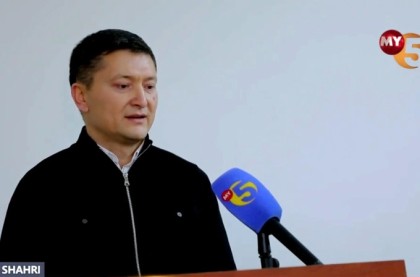The British Council, the UK's international organisation for cultural relations and educational opportunities, has just presented the results of a survey which answers some of the key questions included in its book The Future of English: Global Perspectives, in the framework of the first anniversary of its publication.
A total of 1,792 education professionals, mainly teachers, leaders and civil servants, from 92 countries, including Uzbekistan, took part in the survey.
The results show that 60 per cent of respondents worldwide believe that English will 'definitely' remain the most widely spoken language in the world.
Europe is the region of the world with the highest percentage of professionals (49.6 per cent) who say that English-only speaking countries will 'probably' be disadvantaged in the future, followed by 19.9 per cent who say that these countries will 'definitely' be affected.
‘Being multilingual is a reality for many Europeans who need to know other languages in addition to English. In these countries, speaking only English can be a disadvantage, as it is necessary not only to speak other languages but also to be truly multicultural', stated Mina Patel, co-author of The Future of English: Global Perspectives book and head of the Future of English research programme.
In Europe, there is a balance between respondents who think that teachers will be ‘partially’ affected by Artificial Intelligence (AI) (48.2 per cent) and those who say 'no' (43.5 per cent). Looking at the global results by job role, 50.9 per cent of teachers and 51.3 per cent of government officials worldwide responded that teachers won't be replaced by AI.
Mina Patel claims: ‘Education, like other sectors, is being impacted by the use of AI. Technology is not changing what we do, but how we do it. AI will not replace teachers because young people who learn languages informally are also the ones who say that they need teachers to guide them. This means that the role of the teacher is fundamental and that we still need the support and structure that the education systems can provide’.
When it comes to learning, 44 per cent of respondents worldwide believe that English learners are ‘partially’ learning the right things for their future, followed by 29 per cent who say they are ‘fully’ learning them.
Among European participants, 58.7 per cent answered, ‘yes partially’, while only 2.5 per cent said ‘yes fully’. 23.6 per cent of participants expressed doubts on this topic by answering ‘not sure’.
‘During the round tables held as part of the research for the book The Future of English: Global Perspectives, European participants mentioned that young people are not fully prepared when they take up a new job. This means that language and the skills that go with it are very different. It will be necessary to focus on the integration of skills and language, as language does not work in isolation: we use it for a purpose and it’s instrumental,’ comments the head of the Future of English research programme.
Trends and predictions
- Generative AI and the role of teachers. The perception has evolved, and AI is now seen as an opportunity to think out of the box and beyond inequality. Given this reality, Patel remarks the importance of ‘not having teachers left behind’ in a scenario where students know more about technology and are able to use it in a smarter way than their teachers. The expert thinks that it’s the right moment for education professionals to determine which methodology should guide the use of new technologies and not the other way around to keep teachers skilled and empowered.
- Teacher wellbeing. In line with the first prediction, there’s a sparkling debate about the ever-evolving role of teachers and how this may affect their emotional wellbeing. Patel raises a general reflection on the current workload and demands for teachers, the social value and recognition of their work and the lack of training opportunities in a challenging environment.
- The debate about how English fits with other languages and how we can use them to learn English is outside. In countries where multiple languages are at play, both in society and in the classroom, there a raising discussion of how English should coexist with them in the curriculum.
- Informal learning and education reform. Given the fact that much learning happens outside the classroom and event incidentally (at work or using social media, online courses and AI tools), public and private education systems should think about this carefully. Public-private collaboration to leverage informal ways of learning into education systems is key to enhance creativity and flexible timetables aligned with the current needs of students and the whole society.
- Education professionals are recognising its importance and the support that should be given to teachers, particularly in formative assessment, to help learners with their learning and development.
Committed to innovation in education: coming research and events
Next steps in the Future of English research agenda include four different pieces of work that are being conducted by the UK universities awarded The Future of English Research Grants in 2023. There is an ongoing project about comparing English language curricula in different countries with a pilot in East Asia and new research has been commissioned about the socio-economic impact of English. Professionals interested in participating and learning about the latest research activity around the future of this language can visit this webpage: www.britishcouncil.org/future-of-english.
On 19 and 20 November 2024, the British Council will host the ELTons Festival of Innovation. This is a development from the ELTons Innovation Awards which celebrate innovation in English language teaching, learning and assessment. It will be an online programme of free events culminating in the announcement of this year’s award winners. The programme will also feature some content about the Future of English and trends in the sector. Teachers interested in joining can register here: www.britishcouncil.org/english-assessment/eltons/festival-of-innovation.
The Future of English: context
The Future of English: Global Perspectives book drew conclusions from round tables attended by 92 experts and education policymakers from 49 countries and territories. Given that 67 per cent of the global population was exposed to or spoke English in 2017, the British Council book aims to find clues to understanding the current landscape of its use, and to help education policymakers and experts plan and prepare for future needs. This work also presents recommendations on the agenda that should guide English language research in the coming years, including the design of frameworks to evaluate the effectiveness of educational methodologies and policies; the creation of English language proficiency profiles that allow comparisons between countries and regions; and the measurement of the social and economic benefits associated with the development of English language skills.
About the British Council
The British Council is the UK's international organisation for cultural relations and educational opportunities. We support peace and prosperity, building connections, understanding and trust between people in the UK and countries around the world. We do this through our work in arts and culture, education and the English language. We work in over 200 countries and territories and are on the ground in over 100 countries. www.britishcouncil.org.















